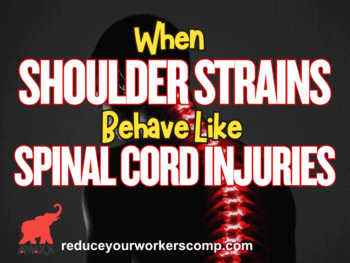Adjuster Will See Thousands of Claims
Throughout the course of an adjuster’s career they will handle hundreds if not thousands of claims. Most of these claims will be audited for company and state compliance, and plans of action will be discussed on all of them. Whether to deny or accept claims can be based on a multitude of factors using the comp statues and company policies as guidelines.
There are no two claims that are exactly alike, the same way that there are no two adjusters that are identical. There is room for interpretation in this field of workers compensation. Adjusters will review the details of a claim and make a decision on the compensability based on their investigation. But not all of these factors are based purely on law alone. There are plenty of personality factors that are taken into account, especially when dealing with subjective claims where the claim is questionable. But why would one person’s claim be accepted, when another person with similar circumstances could be denied?
Reputation of the injured worker
One of the questions a claims adjuster will ask the employer is if this claimant is a credible worker. Since the employer deals with this worker day in and day out, they get to know whether this worker is a “troublemaker” or “dramatic” over the course of time. Some workers are known for being drama kings and queens, where they can complain about every little thing. Other workers are workhorses, complaining little if at all about the work and just putting their nose to the grindstone and getting the job done day after day. When it comes to subjective injury, especially one that is not witnessed, the claims adjuster will hold a lot of weight on the worker’s credibility. Sometimes this fact alone can determine whether or not a claim is accepted or denied, where the adjuster will lean towards denial of the claim based on credibility of the worker alone. This is by no means applicable to all cases, but it can come up in the minor ones. This fact can be very true if the worker has a history of reporting injuries about every little nick or strain.
On the other hand, if a “good” worker has a subjective injury, and little to no injury history, then you can bet that the employer will pass that on to the adjuster. Chances are that this claim would be accepted just based on the fact that this particular worker is never hurt, a good worker, and because they reported an injury means that they are probably in need of some medical assistance to recover. Whether this is considered ethical or not is in the eyes of the beholder, but it is a reality.
It can be viewed as negative in the eyes of an adjuster if the worker was recently moved, assigned a different job, suffered a wage decrease, or was recently disciplined. It can be seen as “getting back” at the employer if one of these events happens and all of the sudden a worker claims an unwitnessed subjective strain injury. Whether it was warranted or not, employees can harbor some resentment towards their employer for whatever “wrong” was committed. A lot of workers see filing an injury as a way to get back at their employer. But just because they file an injury doesn’t mean that it will be accepted. This will come down to the investigation of the adjuster on the aspects of the claim. Sure an injury was reported, but if it was not witnessed and the doctor cannot find anything wrong with them, did an injury actually occur?
90% of Claims Are Accepted
Keep in mind that for the most part, approximately 90% of claims are accepted. The adjuster sees payment of a few medical bills as less costly than if they deny the claim and the worker files a lawsuit for comp benefits. If this were to happen, the adjuster is now faced with legal fees which would probably be triple what the claim would cost if they had just accepted it, so they may accept it based on that fact alone. It will depend on the facts of the case, the reputation of the employee, and the medical details. If nothing seems to add up, then you can bet the claim will be denied or disputed. The burden of proof is always on the injured worker.
Rapport Between Adjuster and Injured Worker
Maybe the most important factor in claims such as these will be the rapport between the adjuster and the injured worker. Sometimes the relationship is like oil and water. If this is the case, the adjuster may default to questioning everything, and making the claimant do everything by the book exactly. If the relationship is rocky the adjuster leans toward an overall denial versus acceptance. Especially true will be those claimants that call the adjuster over and over and over again, but not in a positive way. Saying that the “squeaky wheel gets the grease” is not always true. Sure it is common for someone to have questions about their claim, but when it turns negative in nature, adjusters are taught to notice that something may be up. That will make them take another look at the claim to make sure everything adds up.
On the other side of the coin, let’s say the adjuster and the injured worker click for whatever reason. The employer sees the worker as a “good guy” and the investigation doesn’t turn up anything to go crazy about. In this scenario, adjusters are likely to give an injured worker the benefit of the doubt. This adjuster can let a few things slide and can push the claim towards compensability versus a denial, based on their relationship alone.
Is This Ethical? Not Really.
So is this ethical? Just because two people do not seem to see eye to eye, does that mean that their claim should be denied due to a personality conflict? The answer depends. Ethical adjusters can look past any personality flaws and focus purely on the facts of the case, and they can make their decision on compensability based on that alone. For all intents and purposes that is the proper way that adjusters should conduct themselves. However, this is not reality.
This is where managers and audits should come in to play. Even if everyone on Earth did not like said claimant, that should not mean that this worker cannot get their fair shake when they file for a work injury. This point should be taught to newer adjusters, and the veteran adjusters should be reminded of this from time to time. This is the proper and professional way to conduct the determination of claims, day in and day out, no matter how little or how often you have to argue with a claimant. Personal feelings and attitudes need to be left in your car in the parking lot when you come in to work. They should not influence if a claim is accepted or denied.
Summary
Adjusters will get along with some people, and they will have conflict with some people. That is the nature of the business. But professional adjusters can leave their personal opinions outside of the workplace, and handle claims based on the merits of their investigation. If the employer does not see this happening, then something needs to be said to the adjuster. Everyone deserves the right for a fair, non-biased claim investigation and determination.
Author Rebecca Shafer, JD, President of Amaxx Risk Solutions, Inc. is a national expert in the field of workers compensation. She is a writer, speaker, and publisher. Her expertise is working with employers to reduce workers compensation costs, and her clients include airlines, healthcare, printing/publishing, pharmaceuticals, retail, hospitality, and manufacturing. She is the author of the #1 selling book on cost containment, Workers Compensation Management Program: Reduce Costs 20% to 50%. Contact: RShafer@ReduceYourWorkersComp.com.
Editor Michael B. Stack, CPA, Director of Operations, Amaxx Risk Solutions, Inc. is an expert in employer communication systems and part of the Amaxx team helping companies reduce their workers compensation costs by 20% to 50%. He is a writer, speaker, and website publisher. www.reduceyourworkerscomp.com. Contact: mstack@reduceyourworkerscomp.com.
WORKERS COMP MANAGEMENT MANUAL: www.WCManual.com
Do not use this information without independent verification. All state laws vary. You should consult with your insurance broker or agent about workers comp issues.
©2012 Amaxx Risk Solutions, Inc. All rights reserved under International Copyright Law. If you would like permission to reprint this material, contact us at: Info@ReduceYourWorkersComp.com.



























